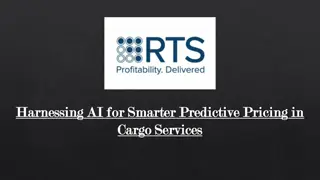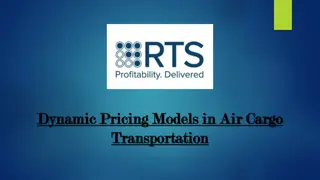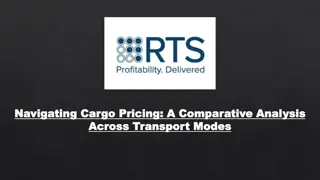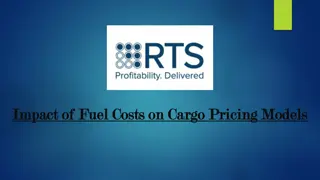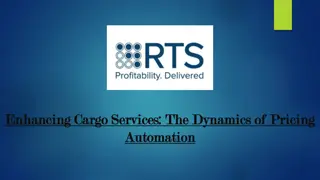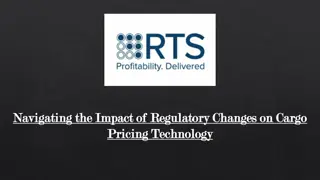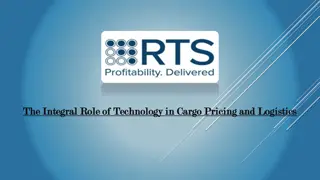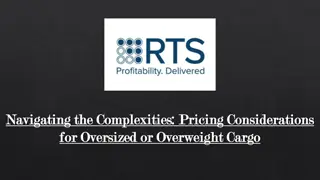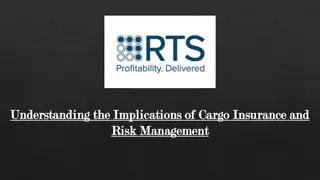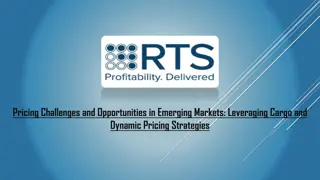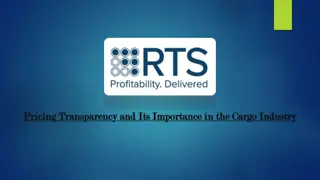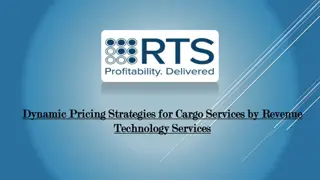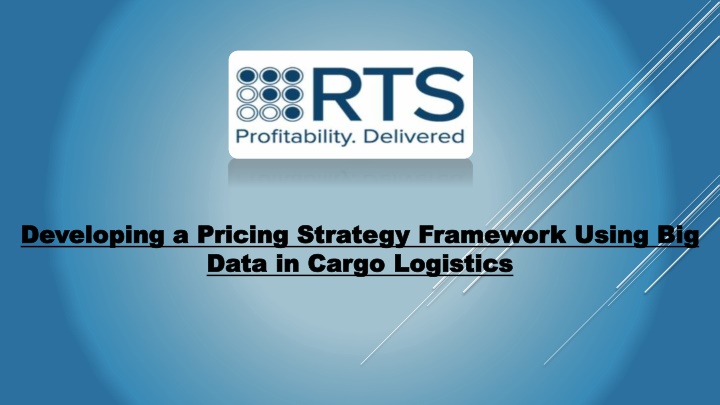
Developing a Pricing Strategy Framework Using Big Data in Cargo Logistics
In the rapidly evolving world of cargo logistics, developing an effective pricing strategy is crucial for maintaining competitive advantage and maximizing profitability. With the integration of Big Data and advanced revenue technology services, companies can implement a sophisticated pricing strategy framework that enhances decision-making processes and drives business growth. This article explores how Big Data can be utilized to revolutionize cargo pricing and dynamic pricing models in the cargo logistics sector.n
Download Presentation

Please find below an Image/Link to download the presentation.
The content on the website is provided AS IS for your information and personal use only. It may not be sold, licensed, or shared on other websites without obtaining consent from the author. If you encounter any issues during the download, it is possible that the publisher has removed the file from their server.
You are allowed to download the files provided on this website for personal or commercial use, subject to the condition that they are used lawfully. All files are the property of their respective owners.
The content on the website is provided AS IS for your information and personal use only. It may not be sold, licensed, or shared on other websites without obtaining consent from the author.
E N D
Presentation Transcript
Developing a Pricing Strategy Framework Using Big Developing a Pricing Strategy Framework Using Big Data in Cargo Logistics Data in Cargo Logistics
In the rapidly evolving world of cargo logistics, developing an effective pricing strategy is crucial for maintaining competitive advantage and maximizing profitability. With the integration of Big Data and advanced revenue technology services, companies can implement a sophisticated pricing strategy framework that enhances decision-making processes and drives business growth. This article explores how Big Data can be utilized to revolutionize cargo pricing and dynamic pricing models in the cargo logistics sector. Understanding the Impact of Big Data on Cargo Pricing Understanding the Impact of Big Data on Cargo Pricing Big Data is transforming the cargo logistics industry by providing an unprecedented volume of insights from multiple sources such as market trends, customer behavior, operational costs, and competitor pricing strategies. By harnessing this vast amount of data, logistics companies can gain a deeper understanding of the factors that influence pricing and can adjust their strategies in real- time. The ability to analyze and act upon large datasets allows businesses to optimize their cargo pricing models to reflect current market conditions more accurately.
The Role of Revenue Technology Services The Role of Revenue Technology Services Revenue technology services play a pivotal role in translating Big Data insights into actionable pricing strategies. These technologies leverage algorithms and analytics to process complex datasets, helping businesses predict demand fluctuations and adjust prices accordingly. The integration of these services facilitates the adoption of dynamic pricing models, where prices are continuously adjusted based on real-time data. This approach not only improves revenue management but also enhances customer satisfaction by offering prices that are fair and aligned with market dynamics. Implementing Dynamic Pricing in Cargo Logistics Implementing Dynamic Pricing in Cargo Logistics Dynamic pricing is a strategy that allows cargo logistics companies to adjust their pricing based on various real-time factors, including demand, supply conditions, and competitor pricing. This flexibility is crucial in an industry where prices can fluctuate significantly due to factors such as seasonal demand, fuel prices, and geopolitical events. By implementing dynamic pricing, companies can respond to these changes instantaneously, thereby optimizing their revenue and ensuring that their pricing remains competitive. To effectively implement dynamic pricing, logistics companies must develop robust frameworks that can handle the complexity of real-time data analysis. This involves integrating predictive analytics tools that can forecast demand and supply trends and suggest optimal pricing decisions. Furthermore, it requires a solid technological infrastructure that supports the continuous flow and processing of Big Data.
Challenges and Considerations Challenges and Considerations While the benefits of using Big Data for cargo pricing are significant, there are several challenges that companies must address. Data quality and integrity are paramount; inaccurate or incomplete data can lead to poor pricing decisions that may harm the company s profitability and reputation. Additionally, companies must ensure they comply with all relevant regulations concerning data privacy and protection. Another consideration is the potential impact on customer perceptions. Dynamic pricing must be managed carefully to avoid alienating customers who might perceive frequent price changes as unfair or opportunistic. Transparent communication about how prices are set and the factors influencing them can help mitigate these concerns. Conclusion Conclusion The adoption of a Big Data-driven pricing strategy framework in cargo logistics offers numerous benefits, including enhanced flexibility, improved competitiveness, and increased profitability. With the support of advanced revenue technology services, logistics companies can implement dynamic pricing models that allow them to stay ahead of market changes and meet their business goals. However, to fully realize these benefits, companies must address the challenges related to data management and customer relations. By doing so, they can harness the full potential of Big Data to revolutionize their cargo pricing strategies, ultimately leading to sustained business success.
THANK YOU THANK YOU

